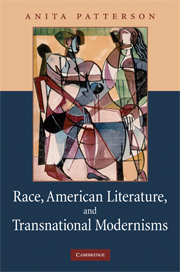Book contents
- Frontmatter
- Contents
- Acknowledgments
- Introduction. Towards a comparative American poetics
- Chapter 1 Transnational topographies in Poe, Eliot and St.-John Perse
- Chapter 2 Hybridity and the New World: Laforgue, Eliot and the Whitmanian poetics of the frontier
- Chapter 3 From Harlem to Haiti: Langston Hughes, Jacques Roumain and the avant-gardes
- Chapter 4 Signifying modernism in Wilson Harris's Eternity to Season
- Chapter 5 Beyond apprenticeship: Derek Walcott's passage to the Americas
- Epilogue
- Notes
- Bibliography
- Index
Chapter 2 - Hybridity and the New World: Laforgue, Eliot and the Whitmanian poetics of the frontier
Published online by Cambridge University Press: 22 September 2009
- Frontmatter
- Contents
- Acknowledgments
- Introduction. Towards a comparative American poetics
- Chapter 1 Transnational topographies in Poe, Eliot and St.-John Perse
- Chapter 2 Hybridity and the New World: Laforgue, Eliot and the Whitmanian poetics of the frontier
- Chapter 3 From Harlem to Haiti: Langston Hughes, Jacques Roumain and the avant-gardes
- Chapter 4 Signifying modernism in Wilson Harris's Eternity to Season
- Chapter 5 Beyond apprenticeship: Derek Walcott's passage to the Americas
- Epilogue
- Notes
- Bibliography
- Index
Summary
INTRODUCTION
In 1928, T. S. Eliot distinguished three varieties of vers libre: his own, Ezra Pound's and “that of the disciples of Whitman.” “I will not say,” he wrote:
that subsequently there have not appeared traces of reciprocal influence of several types upon one another, but I am here speaking of origins. My own verse is, so far as I can judge, nearer to the original meaning of vers libre than is any of the other types: at least, the form in which I began to write, in 1908 or 1909, was directly drawn from the study of Laforgue together with the later Elizabethan drama; and I do not know anyone who started from exactly that point. I did not read Whitman until much later in life, and had to conquer an aversion to his form, as well as to his matter, in order to do so.
Swiftly dismissing any consideration of the “clap-trap in Whitman's content,” Eliot argued that Whitman's claim to originality was “spurious,” since what Whitman had heralded as a new form of verse was in fact an instance of great prose.
By 1944, in a lecture on “Walt Whitman and Modern Poetry” at the Churchill Club, Eliot reported that he had conquered at least part of his aversion and had read Whitman, as he put it, “properly.”
- Type
- Chapter
- Information
- Race, American Literature and Transnational Modernisms , pp. 43 - 92Publisher: Cambridge University PressPrint publication year: 2008



